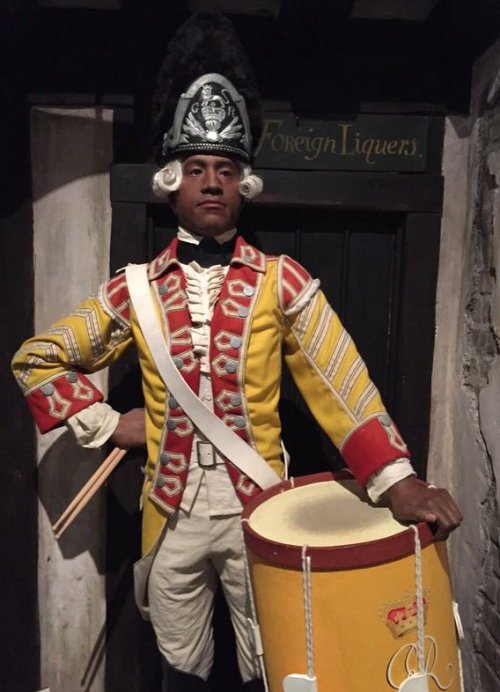Don Hagist, author of British Soldiers, American War and editor of the Journal of the American Revolution, is my go-to advisor on British military records.
Every so often Don unearths a new gem of information about redcoats who served in Massachusetts, such as the record of Edward Montgomery and Mathew Kilroy, the two privates convicted of manslaughter after the Boston Massacre, retiring in 1776 just before the 29th Regiment was sent back to North America.
Now as a guest blogger Don shares another new discovery about a soldier prominent in Boston 250 years ago:
In the months leading up to the Boston Massacre, a number of altercations occurred between soldiers of the 14th and 29th Regiments of Foot and civilians in Boston. One of the best-known soldiers involved in these scuffles was Thomas Walker, a drummer in the 29th Regiment.
The 29th’s drummers were of African heritage, but those those whose place of birth is known were born in the Caribbean—Jamaica, St. Kitts, St. Domingo, Antigua. The first of them joined the regiment in 1759 and were replaced by others as attrition demanded, well into the nineteenth century.
The earliest surviving muster rolls for the regiment indicate that Walker was already serving as a drummer in 1765. He was a key player in the fighting that occurred at the ropewalks in Boston on March 1, 1770. He is frequently mentioned in this context, but what about his subsequent career?
The 29th Regiment was removed from Boston soon after the events of March 5, 1770, and after a few more years in other American colonies they returned to Great Britain. Their stay in the home islands was not long, though; the outbreak of war in American necessitated a significant military buildup there, and in early 1776 the 29th Regiment was ordered overseas once more.
As a drummer in the regiment’s grenadier company, Walker may have been among the first ashore when the regiment landed in Quebec in June 1776 to relieve the besieged city. With several other regiments, they drove American forces out of Canada and up Lake Champlain. Walker may have been among the 29th’s soldiers that served on board British ships and gunboats at the battle of Valcour Island in October.
After spending a cold Canadian winter dispersed in various locations between Quebec and the northern end of Lake Champlain, the British army regrouped for a new campaign in 1777. While most of the 29th Regiment remained in Canada, their light infantry company and grenadier company, including Thomas Walker, went with the army under General John Burgoyne up Lake Champlain. The grenadier battalion, formed of grenadier companies from ten regiments, was involved in some of the campaign’s hottest fighting including the battles of Hubbardton, Freeman’s Farm and Bemis Heights. The campaign ground to a halt in October and Burgoyne’s army capitulated in October. Thomas Walker became a prisoner of war.
The prisoners were marched to the outskirts of Boston where they spent the winter in crude barracks on Winter Hill and Prospect Hill. From here Walker had a good view of the city where he had spent two years almost a decade before. The following summer the prisoners were moved inland to Rutland, Massachusetts. In November they were marched Albemarle, Virginia, where they arrived in the January snow for two more years in poorly-constructed barracks.
British campaigning in Virginia in 1781 provoked yet another overland march for the beleaguered prisoners, this time to Lancaster, Pennsylvania. The prisoners arrived there on June 16. Since their capture in 1777, they had walked over 1,000 miles from prison camp to prison camp. By this time, only four men of the 29th Regiment’s grenadier company remained, the others having escaped, deserted, or died.
Thomas Walker got to Lancaster, but his time had run out; by the time a list was made of the prisoners, on July 18, Drummer Thomas Walker was “dead in the Barracks.” The cause of his demise is not known. Dying in captivity was a sad end for a man who had served as a soldier for over sixteen years.
I’m struck by how Drummer Walker remained with his dwindling company, not escaping and deserting. As a black man, he may have seen fewer opportunities to move around in American society. And he may have commanded more respect as an army drummer than he expected as an unattached black laborer.
Thanks again, Don!

No comments:
Post a Comment